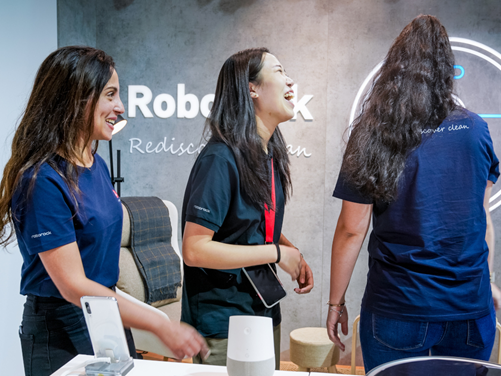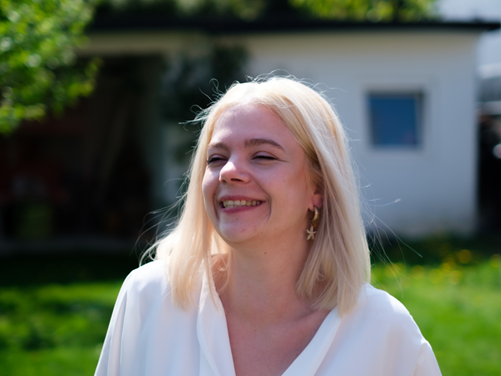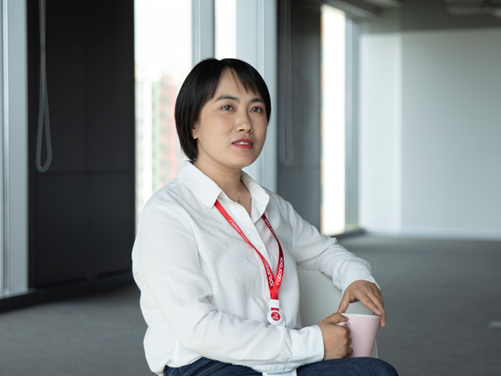Women Of Roborock: A Look into Their Journey And Perspectives In The Tech Industry
2022-05-29 21:00:00 · PeopleWhat is it like working in the tech industry in China?
How does a multinational team of individuals leverage each other’s strengths and experiences to consistently develop industry-leading products?
How does Roborock encourage a culture of innovation?
What drives Roborock’s employees on a day-to-day basis?

We spoke to 7 female employees at Roborock from diverse backgrounds, roles and levels to understand what it is like for them to be part of a fast-growing, predominantly male industry - the tech industry. Part of the lineup includes key decision makers such as Roborock’s Head of Products, Ms. Ruimin Zhang and Roborock’s Senior Director in charge of Software, Ms. Zhiguang Zhou, who very recently in May is stepping into retirement. The lineup also includes female personalities who have a. just entered the workplace, b. took a gap from work, c. worked in large multinational companies. These personalities are currently based in cities including Bali, Shenzhen, Barcelona, Düsseldorf, Hong Kong and Beijing.
This content aims to provide a glimpse into the lives and thoughts of the various personalities behind Roborock’s now-famous robot vacuum products, which are now sold across 40 countries.
1. Tell us about yourself and something few people know about you?

Alexandra Le Mouel, Social Media Specialist, France: I love traveling and have backpacked across different continents. I grew up in Brittany, France and I moved to Paris to study for my Master’s Degree then I started working there. I’ve since stayed in different parts of the world and worked in different tech companies.

Franziska Behner-Thang, Social Media Specialist, Germany: Before joining Roborock I was one of the very few female freelance journalists in the gaming industry. I studied Public Relations and worked in PR and communications in the gaming industry. I love playing video games.

Kim Seoyoung, Sales Manager, Korea: I’m from Korea and I had my first contact with Chinese culture during my third year at university, where I was an exchange student in Taiwan. I totally fell in love and decided to move to Mainland China to study for my Master’s degree. Before long, I decided to stay and continue to work here.

Maria Eugenia, Communications Lead, Spain: I primarily manage Roborock’s Spanish PR but I’m actually not from Spain. I was born and raised in Uruguay, then moved to Spain to study Communications for my Master’s Degree. I treat Spain as my second home and now I work in Hong Kong. You might have guessed it, but I love working in PR and communications.

Sissi Li, Regional Marketing Specialist: I grew up in Shenzhen, China from a diverse, international background. I always wanted to go abroad and eventually I moved to Boston to study for my university. I like volunteering for non-profit work and I’m an advocate for animal rights. I can speak fluent Chinese, English, and Korean.

Zhang Ruimin, Head Of Product: I would describe myself as a product veteran who’s been working in tech for 10+ years. I’m a mother of a 7-year-old boy, and I’m a very curious person who loves nature. I studied Geology for my undergraduate degree to explore the world and this planet. I eventually took interest in Marketing and got my Master’s degree in it.
Zhou Zhiguang, Senior Director, Software: I was a software developer who made a switch to become a project manager in the tech space. I pretty much spent my entire life in Beijing, China, and I call this city my home.
2. How would you describe your job?
Alexandra Le Mouel: I manage social media for the French market and I’m the voice for Roborock across these channels. My work involves producing content for our social media channels, data analysis, and engaging with our audience.
Kim Seoyoung: I’m in charge of online sales & marketing in Korea. I work closely with distributors and merchandisers, to make sure a consistent brand messaging is aligned across all parties.
Zhang Ruimin: I oversee Roborock’s product development efforts, which includes strategic planning and the management of the entire product portfolio.
3. How did you kickstart your career in tech? Are there any twists on the path that led to your job at Roborock?
Kim Seoyoung: I first got in touch with this industry during my internship at a Korean trade and investment agency where I took part in market research for China’s tech industry, and I found it extremely fascinating. After getting my Master’s Degree I started working at tech companies like Ctrip and Anker. The business decisions of a company put me at a crossroads where I have to either relocate to Korea or South America. But for me, the best choice is actually to stay in this country and in this industry that I love, so I moved to Shenzhen and joined Roborock.
Sissi Li: After ending college one semester early, I moved to Hawaii to work at a hotel that’s part of a large global hospitality group. I worked there for 6 months and I have to say it was one of the best experiences of my life. I returned to Shenzhen upon the completion of my Master’s degree. I’ve always viewed tech as a prestigious industry, especially witnessing how the city that I’ve grown up in grow exponentially over the years, coinciding with the boom in the tech industry here. While I knew early on that I wanted to work in this industry, I was mindful about not joining a tech giant and instead wanted to be part of a company that I can grow with. I finally decided to join Roborock, which is my first tech job and so far, I’m very happy about my decision.
Zhang Ruimin: After graduating from university, I moved to Beijing and started working at Netease, one of the largest internet technology companies in China, for 2 years. As mobile applications became more popular, I started working at Photowonder, an image beautification app that really took off alongside the whole “selfie” trend. There I met Richard Chang, now CEO of Roborock. Photowonder got acquired by Baidu, the company behind one of the largest search engines in China, so naturally, I started working there. I was involved in both software and hardware products. As Richard, who was then at Baidu, leading the development of the navigational app Baidu Map, founded Roborock, he invited me to join his team. I’ve since been at Roborock.
Zhou Zhiguang: I’ve always liked computers since I was a student, so after graduating I became a software developer at a renowned Beijing tech company. Before joining Roborock I worked in 7 or 8 positions, all related to software development in companies including Microsoft and Ericsson. When I was at Microsoft I met my business partner and together we started our own business which I was a part of for 10 years. I then worked at Ericsson until one of my previous colleagues from Microsoft, who is now an executive at Roborock, reached out to me and asked if I wanted to join the company. There were some thoughts and considerations but eventually, I said yes, and I’ve been with the company for 5 years.
4. What do you think about Roborock’s culture?
Franziska Behner-Thang: Everyone is so down-to-earth, positive and hands-on. If you have an idea and a vision, people are willing to try and give it a shot. This is something I really like about the company.
Kim Seoyoung: I love that people here are willing to listen to you and how linear the teams are. I like to express my thoughts and ideas freely. Some companies might not think this is a good thing and just wanted you to follow the leaders by simply brushing off your ideas, here the team leaders are willing to hear us out, and I think this gives me confidence. Management also fully supports our project leadership. Overall, the work environment just makes me feel very comfortable.
Maria Eugenia: Diversity and a strong multicultural presence are what I like most, I can speak with people across almost all continents in one day. I think this plays a big part in the company’s growth because you need different people to succeed in different markets. This also let me learn how different cultures work differently and has helped me grow as a professional. I also love the company’s innovative mindset and how everyone is working towards the next big thing. It’s something I love being a part of and knowing this motivates me every day.
5. What are your views/ what is it like working in this industry? (E.g. stress, work life balance etc.)
Franziska Behner-Thang: I think work-life balance and stress depend a lot on the company. Most of the time I thought Chinese companies are very strict and demanding, hours-wise, but this is not the case for Roborock. A lot of your experience working in the industry depends on your boss, your colleagues, and the way the company works together. It can be just as good as every other industry. One thing I really like about my team is we start off each day with a 5 – 10 minutes daily stand up call with my manager Noad, where we just talk about life outside of work (our team members are located across four different cities). We get to know each other better and I think this gives me a good feeling to work for the rest of the day.
Kim Seoyoung: This depends on different parts of the world. When we think about companies in this space, the first thing that pops up is creativity and diversity. These values are needed to drive change that happens so fast in this industry and are often seen in the culture of western tech companies, like Google. When I think about the tech companies back home in Korea, my impressions are quite different with a more conservative and strict culture, not to mention long working hours.
Zhang Ruimin: Tech is a very promising industry that makes people feel “forever young” because changes happen so fast. I worked in this industry for 10 or so years and have observed the rise and fall of different platforms, mobile apps, and now the surge in popularity of smart homes. People working in this industry need to constantly learn and absorb knowledge as they’re riding the tide of change, and because of this, I feel like I have a younger spirit compared to my friends and classmates who work in other industries.
6. What do you do to switch off your brain after a busy day? What are you passionate about outside of work?
Maria Eugenia: I try to work out and do sports on a daily basis, mainly running, surfing, and lifting weights. I think exercising calms me and clears my mind. I also love animals and pets, that’s why I like working at Roborock because certain aspects are just so pet-related. When I have time, I like to travel and see different cultures, I’m always ready to go on a trip.
Sissi Li: I like volunteering for non-profit organizations. I went to South Africa for causes in wildlife preservations and a number of Adopt Don’t Shop initiatives for pets in Shenzhen. I also took part in SEED For Social Innovation, a non-government organization that helps non-profits in China to further and better develop.
Zhou Zhiguang: I love video games! I had 3 XBOXes and Switch is my new favorite console. I especially enjoy the dancing games. Tai Chi is another passion of mine - I took part in martial arts competitions when I was in university. Tai Chi might look like a slow exercise, but its powerful buttery movements soothe my heart and at the same time energizes me.
7. What’s the best piece of career advice you received?
Franziska Behner-Thang: I would tell my younger self not to listen to others blindly. Many years ago, one colleague I worked with made some comments questioning my ability to perform at work because I like to wear dresses and makeup. Seems like the combination of skill and being well dressed did not suit each other in his head. Now I wouldn't give it a second thought, but back then I had self-doubts and thought that he might be right. But really, you shouldn’t think like that. Also when you’re looking for a job that says you need a whole list of experiences, a lot of my friends wouldn’t apply because there’s one thing they couldn’t do. I always tell them to just go for it and give it a shot, but at the same time be open and honest about it, and have the willingness to learn it well.
Maria Eugenia: Try to give priority to items that are important over items that are urgent. There will be different urgent requests coming up throughout the day, and we often forget what’s important. Another piece of advice is to be honest with your communication and don’t forget we’re all human. Be empathetic towards others.
Zhang Ruimin: We all know the famous “Stay hungry, stay foolish” quote by Steve Jobs. I remind myself to continue being humble and curious. There’s the other advice Richard always reminds me to not stay in your comfort zone. He encouraged me to explore taking up different roles so as to train myself to always look at things from various perspectives. I have worked in the product development side of things, which includes initializing the product from concept, to the eventual production and testing. I’ve also worked on product marketing efforts. I’m better aware of the key considerations and concerns from various teams now that I’ve properly placed myself in these various roles, which will only help refine future decision making processes.
8. What’s the worst piece of career advice you received?
Alexandra Le Mouel: I love taking risks and I had been backpacking for a year across the Americas, Asia, Australia, and New Zealand. I raised this idea to people around me and many told me that it was a bad idea because there’s a chance finding a job will be hard afterward, but I still jumped on the opportunity. Not only did it become one of the best experiences of my life, but I also got some good job offers - I believe my traveling experience has played a big role in helping me understand myself better.
Maria Eugenia: Work in an area, even if you don’t particularly enjoy it. I’ve had people suggest that I work in finance due to the potential to make a lot of money, plus it is always on-demand. To me, I couldn’t imagine working in something that’s not in communication. Even in tech, I couldn’t become a programmer even if I had the skills, simply because it’s not an area I’m interested in.
9. What would you tell someone just starting off in the industry?
Kim Seoyoung: Tech companies shouldn’t just focus on making money and products with the best specs. Technology is also a method to communicate love and bring people together. Just like social media can connect different people from faraway, robot vacuums help clean homes so people can funnel their time into the things they love. In other words, tech can become part of the process of self-realization and improvement. I believe I’m making a difference to people because I’m part of this process. I hope newcomers to the industry can continue to make an impact on people as I think those who work in this industry can make the world a better place.
Sissi Li: Validations and encouragement are important among co-workers. We are humans after all who just happen to be in an environment called a workplace. So sometimes we can talk about things that are not work-related, and spending some time together outside of working hours is also important.
Zhang Ruimin: Love your product, love your users. Respect your users and don’t treat them as a source of revenue. We have to carefully listen to their asks and their feedback. Be humble and just because a person is in charge of a product, he or she should still be open-minded. Whenever we receive feedback, no matter whether it’s right or wrong we should first learn to accept it, then see whether we have room to improve. Some product managers are more self-centered and will create a product just to satisfy their own self-esteem and sense of achievement. A product manager should focus on their users and create value for them.
Zhou Zhiguang: Confucius once said “When three walks together, I am sure to find teachers among them.” Always carry an “empty-bottle” mentality. When in a team, focus on identifying the good qualities of your fellow team members and potentially learn from them.
Technology is changing ever so quickly, and there’s never a set rule of how exactly to do things., Working practices and even knowledge become irrelevant in a blink of an eye.
We have to keep up with what’s new. I’ve never like telling my younger members how to do things. I believe the younger generation all have their own methods of working, and as a team, everyone should learn from each other. A person who wants to grow and improve will automatically pick up new skills and find the best way to complete a task. A person who prefers to remain where they are will not learn a thing no matter how much you want to teach them.
___
Relevant Facts:
1. Total Number Of Roborock Robot Vacuums Sold Globally: 10 Million Units
2. Female Employees: 37%
3. Female In Management Positions: 29%